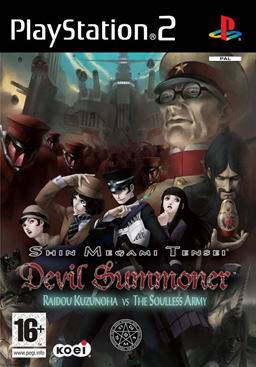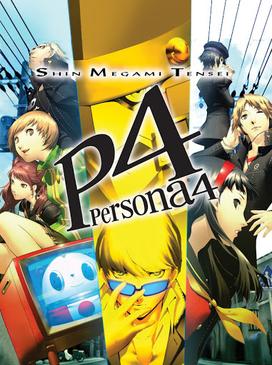
Atlus Co., Ltd. is a Japanese video game developer, publisher, arcade manufacturer and distribution company based in Tokyo. A subsidiary of Sega, the company is known for video game series such as Megami Tensei, Persona, Etrian Odyssey, and Trauma Center, as well as Print Club (Purikura) arcade machines. Its corporate mascot is Jack Frost, a snowman-like character from their Shin Megami Tensei series. Outside of video games, the company is known for their Purikura arcade machines, which are selfie photo sticker booths popular in East Asia.
Megami Tensei, marketed internationally as Shin Megami Tensei, is a Japanese media franchise created by Aya Nishitani, Kouji "Cozy" Okada, Ginichiro Suzuki, and Kazunari Suzuki. Primarily developed and published by Atlus, and currently owned by Atlus, the franchise consists of multiple subseries and covers multiple role-playing genres including tactical role-playing, action role-playing, and massively multiplayer online role-playing. The first two titles in the series were published by Namco, but have been almost always published by Atlus in Japan and North America since the release of Shin Megami Tensei. For Europe, Atlus publishes the games through third-party companies.

Shin Megami Tensei is a role-playing video game developed and published by Atlus for the Super Famicom. Originally released in 1992 in Japan, it has been ported to multiple systems and eventually released in the West for iOS in 2014. It was released on the Virtual Console service in Japan on Wii in 2007 and on Wii U in 2013, as well as Nintendo Switch Online in 2020. It is the third game in the Megami Tensei series and the first in the central Shin Megami Tensei series. The gameplay uses first-person navigation of dungeons and turn-based battles against demons. The player can recruit demons as allies by talking to them rather than fighting them, and two to three demons can be fused to create new demons.

Revelations: Persona is a 1996 role-playing video game developed and published by Atlus. It is the first entry in the Persona series, itself a subseries of the Megami Tensei franchise, and the first role-playing entry in the series to be released in the west. Originally released for the PlayStation in 1996 in Japan and North America, the title was ported to Microsoft Windows in 1999. A port to the PlayStation Portable retitled Shin Megami Tensei: Persona was released in North America and Japan in 2009, and the following year in Europe. This port featured new cutscenes and a reworked English localization that was more faithful to the original Japanese release. The PlayStation version was also released for the PlayStation Classic on December 3, 2018 worldwide, marking the PlayStation version being released in Europe for the first time.

Shin Megami Tensei III: Nocturne is a role-playing video game developed by Atlus for the PlayStation 2. It was published by Atlus in Japan and North America, and by Ghostlight in Europe. It is the third numbered entry in the Shin Megami Tensei series, the central series in the Megami Tensei franchise. Multiple versions of the game have been published: the original version was published in Japan by Atlus in 2003, while a director's cut was released in 2004 in Japan. The director's cut was localized and released in North America in 2004 as Shin Megami Tensei: Nocturne and in PAL regions in 2005 as Shin Megami Tensei: Lucifer's Call. A high-definition remaster was released for the Nintendo Switch and PlayStation 4 in Japan in 2020, and was internationally released in 2021 on those consoles and Windows.

Shin Megami Tensei: Digital Devil Saga is a duology of role-playing video games developed by Atlus for the PlayStation 2. They are a spin-off of the Megami Tensei series. The first Digital Devil Saga was released in Japan in 2004, North America in 2005, and Europe in 2006. Its direct sequel, Shin Megami Tensei: Digital Devil Saga 2, released in 2005 in Japan and North America, and 2007 in Europe and Australasia. The games were published in Europe and Australasia by Ghostlight and in other regions by Atlus and its North American subsidiary Atlus USA.

Shin Megami Tensei If..., stylized as Shin Megami Tensei if…, is a role-playing video game developed and published by Atlus in 1994 for the Super Famicom. It is a spin-off from the Shin Megami Tensei series, itself part of the larger Megami Tensei franchise. Since release, it has been ported to mobile devices, PlayStation and Microsoft Windows; it had also been re-released on the Virtual Console in Japan on Wii in 2011 and Wii U in 2013, as well as Nintendo Switch Online in 2021. The story follows a student of Karukozaka High School after their school is sucked into the realm of demons by a vengeful student's demon summoning spell going wrong.

Devil Summoner: Soul Hackers is a 1997 role-playing video game developed by Atlus. The game is the second installment in the Devil Summoner series, itself a part of the larger Megami Tensei franchise. Originally published by Atlus for the Sega Saturn, it was later ported to the PlayStation in 1999 and Nintendo 3DS in 2012.

Persona 3, released outside Japan as Shin Megami Tensei: Persona 3, is a 2006 role-playing video game developed by Atlus that is the fourth main installment in the Persona series, which is part of the larger Megami Tensei franchise. It was originally released for the PlayStation 2 in Japan in 2006 and in North America in 2007. It has received several enhanced re-releases and ports: Persona 3 FES, an extended version featuring a new playable epilogue and other changes, was released for the PlayStation 2 in Japan in 2007 and worldwide in 2008. An abridged PlayStation Portable version, Persona 3 Portable, was released in Japan in 2009, North America in 2010, and Europe in 2011, and ported to the Nintendo Switch, PlayStation 4, Windows, Xbox One, and Xbox Series X/S in 2023. Persona 3 Reload, a remake of the core game for PlayStation 4, PlayStation 5, Windows, Xbox One, and Xbox Series X/S, was released on February 2, 2024.

Devil Summoner: Raidou Kuzunoha vs. the Soulless Army is an action role-playing game developed by Atlus for the PlayStation 2. The game is the third in the Devil Summoner series, which is a part of the larger Megami Tensei franchise. It was published by Atlus in Japan and North America in 2006, and in Europe the following year.

Shin Megami Tensei: Devil Summoner is a role-playing video game developed and published by Atlus. Forming part of the Megami Tensei franchise, it is the first title in the Devil Summoner series. It was first released for the Sega Saturn in December 1995, and received a port to the PlayStation Portable in December 2005. Despite reports of it being planned for localization, neither version has been released outside Japan.

Persona 4, released outside Japan as Shin Megami Tensei: Persona 4, is a 2008 role-playing video game by Atlus. It is chronologically the fifth installment in the Persona series, itself a part of the larger Megami Tensei franchise, and was released for the PlayStation 2 in Japan in July 2008, North America in December 2008, and Europe in March 2009 as one of the final major exclusives for the system. It was re-released as a PlayStation 2 Classic for the PlayStation 3 in April 2014. Persona 4 takes place in a fictional Japanese countryside and is indirectly related to earlier Persona games. The player-named protagonist is a high-school student who moved into the countryside from the city for a year. During his year-long stay, he becomes involved in investigating mysterious murders with a group of friends while harnessing the power to summon physical manifestations of their psyches known as a Persona.

Devil Summoner, initially marketed as Shin Megami Tensei: Devil Summoner, is a video game franchise developed and primarily published by Atlus. Focused on a series of role-playing video games, Devil Summoner is a spin-off from Atlus' Megami Tensei franchise. The first entry in the series, Shin Megami Tensei: Devil Summoner, was released in 1995 for the Sega Saturn. The series has seen several more games since, with the most recent main entry being Soul Hackers 2 released in 2022.

Shin Megami Tensei: Devil Survivor is a tactical role-playing video game in the Megami Tensei series developed by Atlus for the Nintendo DS. It was released in Japan on January 15, 2009, and in North America on June 23, 2009. An enhanced port for the Nintendo 3DS, Shin Megami Tensei: Devil Survivor Overclocked, was also developed by Atlus and released in 2011 for Japan and North America while in 2013 for Europe.
Persona, previously marketed as Shin Megami Tensei: Persona outside of Japan, is a video game franchise primarily developed and published by Atlus, and owned by Sega. Centered around a series of role-playing video games, Persona is a spin-off from Atlus' Megami Tensei franchise. The first entry in the series, Revelations: Persona, was released in 1996 for the PlayStation. The series has seen several more games since, with the most recent main entry being 2024's Persona 3 Reload.

Shin Megami Tensei: Strange Journey is a role-playing video game developed by Atlus and Lancarse for the Nintendo DS. The game is the sixth entry in the Shin Megami Tensei series, which forms the core of the Megami Tensei franchise. It was released in Japan in 2009, and in North America in 2010. An enhanced port for the Nintendo 3DS, Shin Megami Tensei: Strange Journey Redux, was released in Japan in 2017, and was released internationally in 2018 by Atlus in North America and Deep Silver in Europe.

Tokyo Mirage Sessions ♯FE is a 2015 role-playing video game developed by Atlus and published by Nintendo for the Wii U home console. The game is a crossover that combines gameplay, narrative, and aesthetic elements from Atlus's Shin Megami Tensei and Nintendo's Fire Emblem series. It was released in Japan in December 2015 and worldwide in June 2016. An enhanced port for the Nintendo Switch, Tokyo Mirage Sessions ♯FE Encore, was released on January 17, 2020.

Shin Megami Tensei: Liberation Dx2 is a role-playing video game developed and published by Sega for iOS and Android. It is part of Atlus' Shin Megami Tensei (SMT) series, which in turn is part of the larger Megami Tensei franchise. The plot follows a player-customised character who battles demons with a smartphone app. The game was presented in the 2017's Tokyo Game Show by SEGA and Atlus. It was initially released in January 2018, in Japan, Taiwan, Hong Kong and Macau, and later released worldwide. A mode similar to Pokémon Go was later added after the game's launch, showing demons in augmented reality.

















